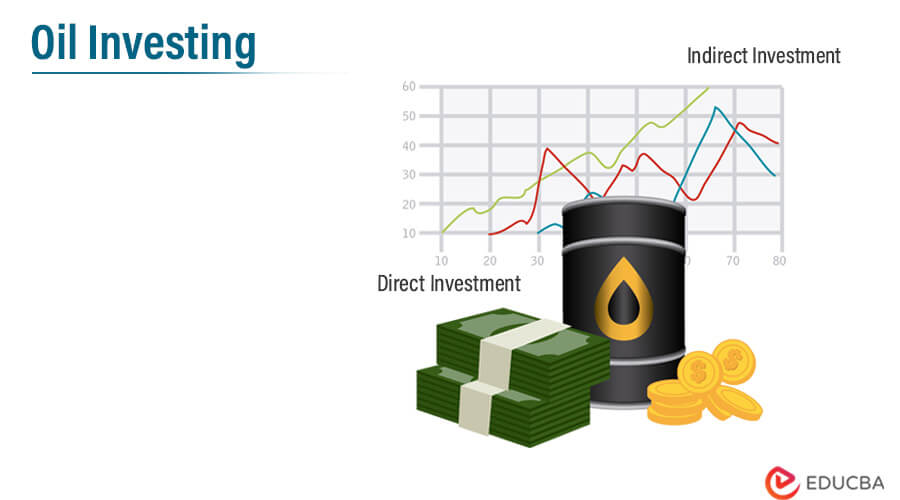Updated July 15, 2023
What is Oil Investing?
The term “Oil Investing” refers to the process of investing in oil or its other allied sectors through direct (in the form of a commodity) or indirect (in the form of energy-related equity stocks, options & futures contracts, or exchange-traded funds) investment methods.
Basically, there are various options available for investors who intend to gain access to oil as an investment. However, each option has a unique combination of risk and reward.
Explanation of Oil Investing
Investing in oil and other related sector isn’t child’s play, as the industry has a long history of volatility that has often resulted in sudden rise and fall in the value of the oil stocks. However, oil stocks have generated massive wealth for knowledgeable long-term investors through capital gains and dividends. Over the period of time, some of the greatest businessmen, such as Jean Paul Getty, John D. Rockefeller, the Koch brothers, etc., have been able to muster the knowledge to understand the movement of this commodity and have made a great fortune through oil investing to become some of the wealthiest people in the history.
In the year 2014, oil prices plummeted in the year, and investors experienced heavy losses during this period. After that, there was a stable period followed by another significant dip in 2020, pushing it into negative territory. But, more often than not, oil prices have managed to bounce back to reach new highs, and the current oil crisis may be no different, which may be an excellent opportunity for investors. Crude oil prices have recovered to some extent to reach $43 per barrel in Aug 2020 after hitting rock bottom at $19 per barrel in April 2020(Source: Macrotrends).
How to Invest in Oil?
There are several ways to invest in oil, and some of the most common avenues have been discussed below:
1. Direct Investment
- Oil Equity: In this method, investors can take exposure to oil companies by taking an equity position. This can be done by purchasing equity stocks of oil companies on a stock exchange or by becoming part of a PE fund or hedge fund that offers equity positions in companies engaged in oil exploration or other related activities.
- Oil-based Futures & Options: In this method, exposure to the oil sector can be gained by purchasing oil-based futures & options. Typically, futures & options are highly volatile, so investors with a high-risk appetite should only go for this investment route. Further, investors should also have extensive knowledge of the oil sector and a large amount of capital.
- Oil-Based Exchange Traded Funds (ETFs): In this method, the investors purchase commodity-based oil ETFs, which are traded on the stock exchange. It is very similar to owing equity stock of oil-based companies. The value of these funds usually moves in tandem with the daily percentage change in the spot price of crude oil.
2. Indirect Investment
- Energy Sector ETFs& Mutual Funds: This is the only method of indirect investment in oil. In this method, investors can take exposure to oil by purchasing energy sector ETFs and mutual funds. These ETFs and mutual funds only invest in the stocks of oil-based companies, that too at a lower risk.iShares Global Energy Sector Index Fund is an example of an energy sector ETF, and T. Rowe Price, New Era Fund, is an energy sector mutual fund.
Importance of Oil Investing
Oil as a resource has economic and strategic importance for many nations as it is still the primary source of a traditional form of energy. Some nations tend to maintain large reserves of crude oil for future use. Investors closely track the crude oil reserves because any change in the stock level is seen as a precursor of production and consumption trend.
There are still several decades of oil reserves available in the ground. Given the sustainable global demand driven by both developed and emerging markets, investment in oil could once again result in massive gains for investors. So, investors must continue to invest in oil-based companies despite the current downtrends.
Advantages
Some of the significant advantages of Oil Investingare as follows:
- Investors can diversify their investment portfolio by investing in oil, which exhibits a low correlation with most other assets. It can be a great technique in a volatile market.
- It offers massive returns, given the high level of risk associated with it.
- There are tax benefits for investors directly investing in it.
Disadvantages
Some of the significant disadvantages of Oil Investingare as follows:
- It exhibits very high volatility wherein the oil prices undergo substantial fluctuations due to various factors, with demand and supply mismatch being the primary ones.
- Only people with knowledge of the oil market should invest, as oil investing is a complex trait given its dependency on multiple factors.
Conclusion
So, it can be seen that oil investing is a highly complex investment activity. It indeed has the potential to generate exponential returns. Still, the high volatility of the sector indicates that only seasoned investors with the proper knowledge should play this game. Investors can reap the benefits of oil investing only through appropriate due diligence and luck.
Recommended Articles
This is a guide to Oil Investing. Here we also discuss the introduction, how to invest in oil, and the advantages and disadvantages. You may also have a look at the following articles to learn more –


